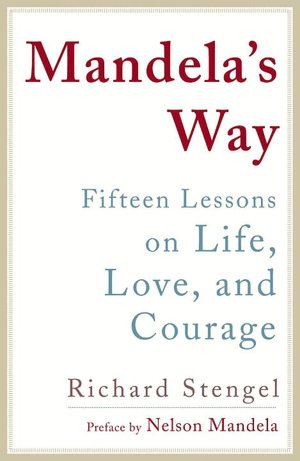
Surely you’ve heard about Nelson Mandela – but how much do you really know about him? Before reading Mandela’s Way by Richard Stengel, my knowledge on the man was fairly low. After reading it, I feel like we could be friends.
In this authorized biography (Nelson Mandela wrote the forward), Richard Stengel sheds a great deal of light on the thoughts, inspiration, and purpose behind the legend’s experience. Through interesting stories and rich interview details, we find out how Mandela could survive – and thrive – amidst his unfathomable 27-year imprisonment in South Africa.
 Among his 15 lessons:
Among his 15 lessons:
Look The Part. You need to carry yourself in the way you want to be perceived by others, otherwise known as “impression management.” Mandela is a man of incredible discipline: while imprisoned, he ran in place for 45 minutes a day, followed by 200 situps and 100 fingertip pushups! But he also makes efforts to cultivate the idea that he is a man of discipline. He wants others to perceive him that way, so he lives accordingly.
Know When To Say No. “Nelson Mandela is not a man of maybes.” Saying no is not always easy – and we tend to forget that No is a complete sentence. Avoid ambiguity and making excuses. Say No when necessary, without muddying it up with justifications and excuses.
Find Your Garden. Although it was unheard of, Mandela was able to convince his captors to allow him to create a small garden patch while in prison. He grew vegetables which were then shared with fellow inmates, guards, and superiors. He pursued his garden primarily so he would have a private space in which to quiet his mind – something he encourages us all to do.
One of my favorite lines from the book speaks to our ability to live positive, look-for-the-best lives that are based in reality:
“It’s not that Mandela does not see the dark side of others, it’s that he is unwilling to see only that. He chooses to look past the negative for two reasons: because he instinctively sees the good in people and because he intellectually believes that seeing the good in others might actually make them better. If you expect more of people, they often contribute more.”
Whether you’re relatively new to Nelson Mandela or have followed his politics for years, this book will illuminate some of his most profound lessons that he admittedly learned during his extended imprisonment. He encourages us to have a ‘core principle’ – to know what is so important that we’re willing to fight for it – and then to proceed through life as planful, compassionate, high-integrity people.





